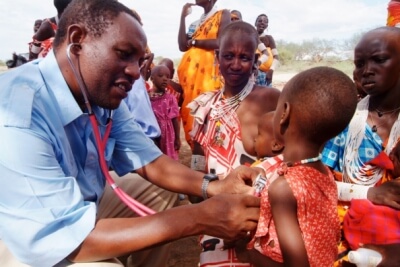Accepting your weaknesses is a hard thing to do, but it’s a huge part of growing up. Just a semester ago, I had to grasp the very adult fact that I did not have–and still don’t have–what it takes to become a doctor.
I started college with very little direction. All I knew was what I didn’t want to study, but that doesn’t really help when you’re trying to map out what you’re going to do for the rest of your life.
I sort of somersaulted into the journalism department: dizzy and not quite sure how I got there. It was where I got the life-altering opportunity to study abroad in Uganda and report on the HIV/AIDS epidemic in eastern Africa. I came back after the month-long trip with a newfound esteem for medical professionals and an itching idea that maybe health science was worth pursuing. When I got back to school, I dove in head first. I am Hannah, future infectious diseases M.D., hear me roar.
A career in science made sense. I wanted to help people and medicine seemed like the only way to do it. The pre-med track would give me the know-how to physically craft solutions to problems, whether they were technological or medical. It didn’t hurt that I had always been focused on the sciences in high school.
I thought I had my whole future planned out in the medical field, but without a degree in chemistry, that future didn’t look so good.
The beginning of my first and only pre-med semester was exactly what I thought it would be: lots of electrons and way too much time spent talking about the sodium potassium pump. I was taking 18 credit hours and they were all science classes. This was a striking contrast to the course load of a communications student. Not that journalism is any less challenging, but it does allow for more free time outside the classroom.
Midterms approached and a few of my classes started to get harder. I had to spend double the amount of time memorizing the path of the digestive system than I did learning how to balance ionic equations. I had known I was signing up for a lot of work, but not this much. I became panicked and overwhelmed, spending every free moment in the Life Sciences library hoping that I’d absorb all the information via osmosis by hanging around the scientifically gifted. You can guess how that worked out.
I can’t forget to mention the teaching assistant in my biology lab. He smiled a condescending smile and laughed at my questions when I just couldn’t quite grasp how to create a serial dilution. He scoffed whenever I turned in my weekly lab report. It got a little too personal when he began to publicly belittle me in front of other students in the class. I won’t go into details, but he made me feel pretty stupid and inadequate.
I drew flow chart after flow chart for the same lab procedure in hopes that it would mentally stick. I thoroughly researched each solvent, solution, powder and gas we’d be using that day before getting to lab.
My struggles in the classroom started to trickle into everyday life. I began to withdraw from close friends and family. I felt alienated by the amount of information that was out there in the world, guilty that I wasn’t memorizing note cards or reading abstracts. Guilt and stress do not a healthy individual make.
By the time finals rolled around, I was exhausted. I could barely stand to look at the mound of papers and books that had accumulated in the corner of my room. I didn’t even know what any of those papers said or meant. I sat staring at it for almost an hour, hoping the pile would come to life or burst into flames.
My TA had successfully killed all my self-confidence. I had lost my passion for the sciences. I was floundering. I turned from the pile to the mirror. A stress-ridden, greasy-haired, gray-faced girl starred back at me. “I cannot do this,” I said out loud. “This is not me.”
It was a tumultuous decision making process, but ultimately the semester ended and so did my dream of becoming an M.D. It was a difficult thing to admit and I felt pretty low at first. Did I just give up on my future patients? Where would the Ugandans living with HIV be if their doctors and nurses decided medical school was just “too hard” for them? Would that stressed-out girl in the mirror be even more haggard now than she was then if I continued?
I have to shake my head like an Etch-a-sketch when I start thinking like this because, in truth, science is not my talent or my calling. And that’s totally okay. I still don’t know what my calling is and I’m going to take my time figuring it out. I rushed into a decision on the whole doctor thing, not thoroughly weighing the options like I should have. Regardless, I’m glad I made such a big mistake. Otherwise, I would have spent years wondering if I had chosen the right path for me. Maybe I’ll head back to the journalism department and see what’s up.



















